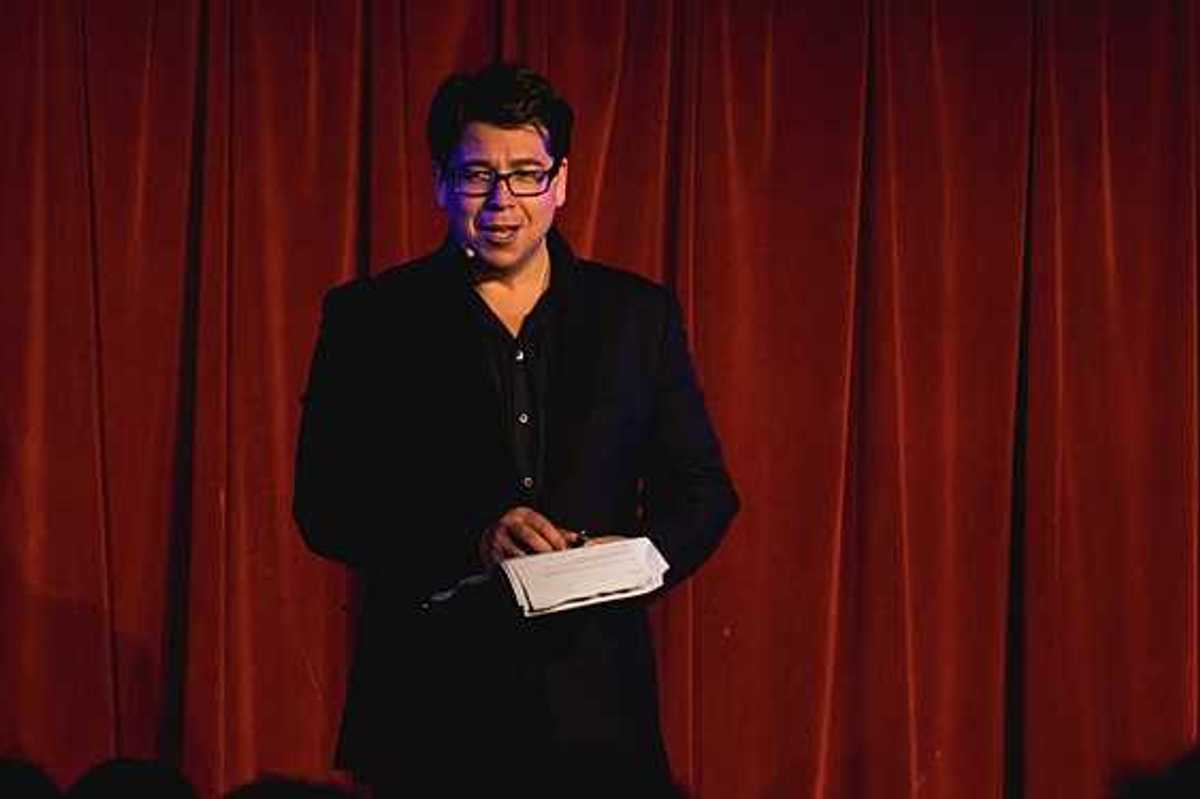British stand-up comic shows what English would sound like if we pronounced silent letters
Both eye-opening and hilarious.

Michael McIntyre is a popular comedian from the U.K.
One of the struggles people have with learning English as a second language is the number of silent letters our language uses that don't seem to have much rhyme or reason. We are certainly not alone in using letters we don't pronounce, of course—French is famously filled with them, and Danish words apparently make liberal use of them as well. However, there's no question that silent letters can make language learning confusing for non-native speakers (and often for native speakers as well).
British comedian Michael McIntyre did a whole bit demonstrating what English would sound like if silent letters weren't silent. What if we pronounced the "b" in "subtle" or the "h" in "hour" or the "l" in "talk" and "walk"? When we start to pronounce the silent letters, we quickly see how many commonly used words have them, and the effect is both eye-opening and hilarious.
- YouTube www.youtube.com
When you speak a language that uses silent letters, you may not realize that there are languages that don't. For instance, this comment on the video—"As a Finn, I'm relieved to finally hear properly spoken English"— only makes sense when you know that Finnish is a strictly phonetic language, meaning the letters you see spelled out are pronounced the same way consistently. Spanish is pretty consistent with phonetics, especially compared to English, and Italian and Greek are as well.
So why does English utilize so many silent letters? As Merriam-Webster states, "Our language is a glutton, and it has taken words from an enormous number of other languages. Since we have words borrowed from languages that have different sound patterns, this results in English speakers pronouncing the words differently than in their languages of origin."
For instance, the word mnemonic has a silent "m" at the beginning, but it didn't used to be silent. The word came to English from the Greek through Latin, and the "m" actually was pronounced in it even as late as the 1800s. Over time, we just dropped it. The same applies to the silent "p" in words like "psychology" and "psalm." We used to pronounce it, and the French and Germans still do, but we've let the "p" go.
Other words came from Dutch or German with sounds that aren't standard phonetics in English, like the throat-clearing sound the "ch" combo makes in those languages (technically called a velar fricative). Words like yacht and night have that sound in the languages they came from, but since we don't do the fricative thing in English, we just dropped it.
What about the "l" in talk and walk, or would and should? In the former, the "l" affects the sound of the vowel, making it an "ah" sound instead of an "a" sound, as in "tack". In the latter, the "l" used to be pronounced, at least in the 1500s in refined speech, but at some point got dropped.
Interestingly, Merriam-Webster says could appears to be an anomaly among the -oulds, though: "It seems likely that could didn’t have the L in either spelling or pronunciation; notice that its root, can doesn’t have an L whereas shall and will (the roots of should and would) do. The thought is that the L in could was later added by analogy—rightly or wrongly—to make it better match with would and should."
Funny how language works.
How about knife and gnome? Apparently, those were pronounced several hundred years ago, but over time, people just stopped. There's not always a clear logical reason for such changes—sometimes it's just easier, and when enough people do it, a collective shift in pronunciation occurs. The same applies to the "w" in "wrap" and "write." They used to be pronounced, but isn't it just much easier on the lips to not form the "w" first when the sounds just blend together anyway?

And yes, we also borrowed from the famously silent-letter-friendly French, as seen in words like receipt, debt, and indict. However, as Merriam-Webster points out, "These words entered English from French in the medieval period, but later scholars recognized their Latin origins and stuck in the missing p, b, and c, just to make the etymological relationship completely explicit. The way we pronounce these words to this day reflects their French heritage (while their spelling reflects their more distant Latin roots)."
One more fun fact: every letter of the alphabet is silent on occasion in the English language.
So there you have it. That's why silent letters abound. English is a mutt language in many ways, which has given us the delightful quirks and inconsistencies that make it a challenge to learn but oh so fun to joke about.






 A group of friends chatting wearing masks.via
A group of friends chatting wearing masks.via 
 A happy Gen X couple have patience for younger generations, like Gen Z.
A happy Gen X couple have patience for younger generations, like Gen Z.
 Imposter syndrome is very common.
Imposter syndrome is very common.  Self-doubt is normal.
Self-doubt is normal.  Use imposter syndrome to assess your strengths and weaknesses.
Use imposter syndrome to assess your strengths and weaknesses. 
 Some stray cats wander from home to home like a drifter.
Some stray cats wander from home to home like a drifter.  Stray cats should be spayed and neutered.
Stray cats should be spayed and neutered. 
 A woman getting her nails painted.via
A woman getting her nails painted.via